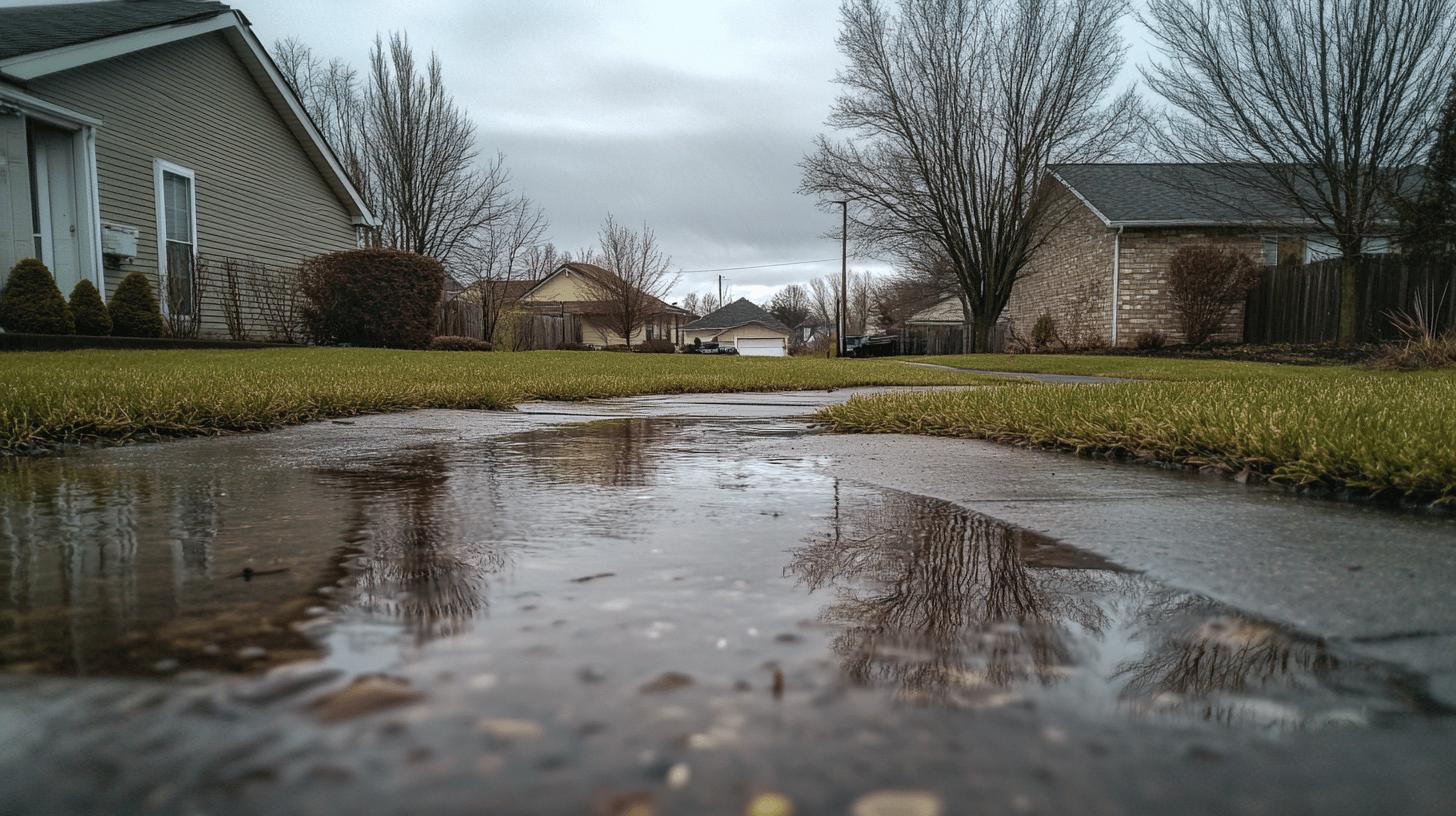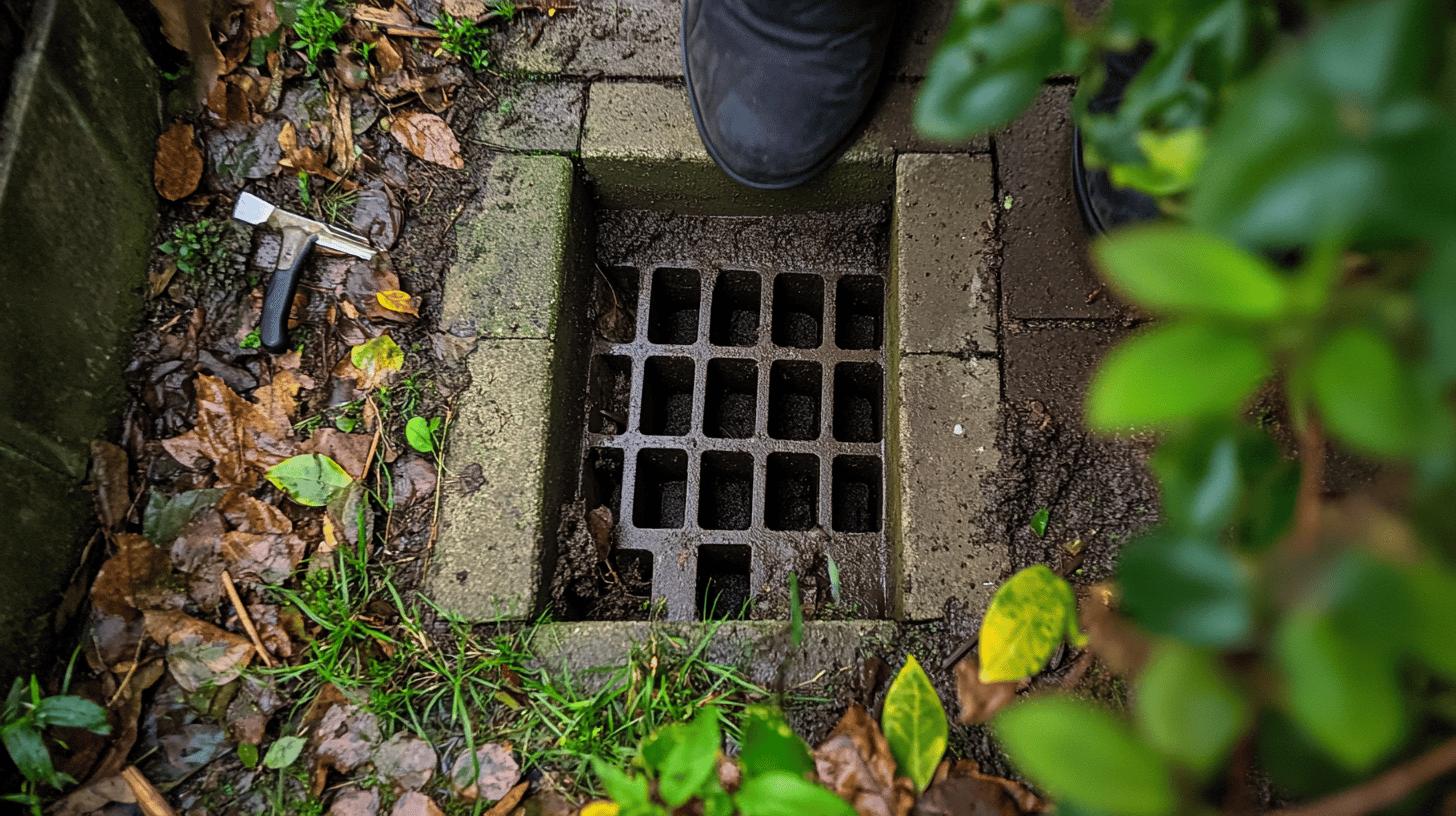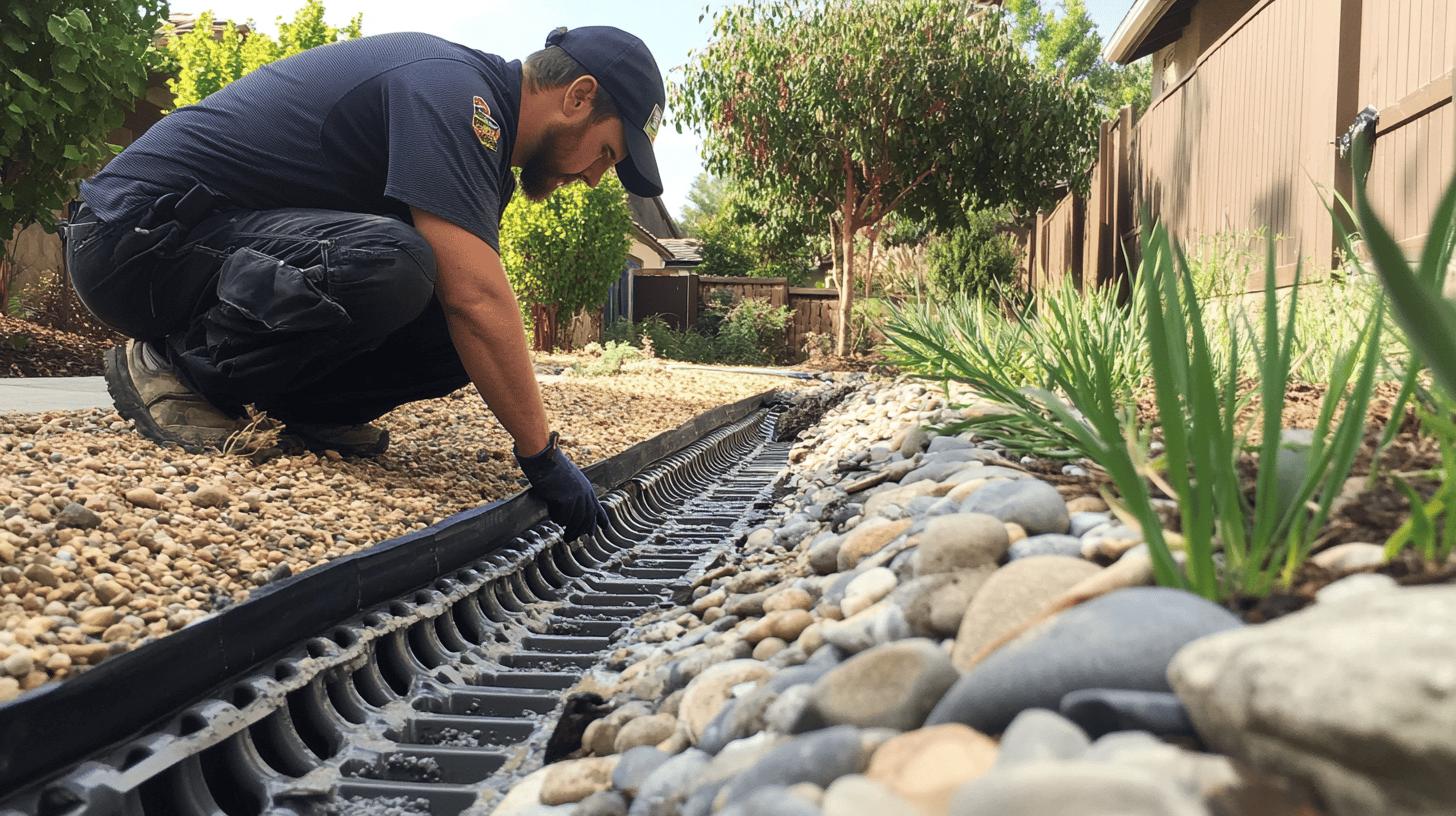TL;DR:
- Clean French drains at least once a year to prevent clogs and water damage.
- Factors affecting cleaning frequency: soil type, rainfall, vegetation, drain location, and history of clogs.
- Signs of cleaning need: slow drainage, water pooling, sodden areas.
- DIY cleaning tips: remove debris, flush with water using a garden hose or pressure washer.
- Hire professionals for severe clogs or complex systems.
- Preventative measures include installing gutter guards, regular debris removal, and proper slope installation.
- Recommended tools: pressure washer for general cleaning, drain snake for tough clogs.
- Routine inspections every two years by professionals ensure effectiveness and early issue detection.
Is your French drain really doing its job, or could it end up causing water damage? Keeping it working well isn’t just a seasonal chore—it’s an important part of home maintenance. Regular cleaning helps prevent clogs and keeps water flowing properly, protecting your home from water problems. But how often should you clean it? Check out our expert tips to keep your French drain in top shape year-round.
Recommended Cleaning Frequency for French Drains
How often should you clean French drains? Experts say at least once a year. Regular cleaning keeps clogs away and water flowing smoothly, reducing the chance of water damage. Consistent upkeep helps your drain work well, especially during heavy rains when good drainage is crucial.
Several factors can affect how often you should clean French drains:
- Soil type: Sandy or loose soil can cause frequent clogs.
- Rainfall levels: Areas with heavy rain may need more frequent cleaning.
- Vegetation: Nearby trees and plants can increase debris.
- Drain location: Urban areas may gather more debris than rural ones.
- Previous issues: A history of clogs may mean more frequent checks are needed.
Skipping regular cleaning can cause big problems like water pooling, basement floods, and even damage to your foundation. These issues can hurt your home’s structure and lead to expensive repairs. Regular checks and maintenance catch problems early, helping your drain system work well.
Signs Your French Drain Needs Cleaning

How can you tell if your French drain needs cleaning? Watch for slow drainage, water pooling near your foundation, or soggy spots in your yard. These are signs your drain might be clogged and struggling to manage water flow.
Ignoring these problems can have serious consequences. Water pooling can damage your foundation, mess up your home’s structure, and cause basement flooding, which can lead to mold and expensive repairs.
If you notice any of these signs, think about getting a pro to check it out. A plumber can figure out the problem and suggest cleaning or repairs. Regular checks from a pro can stop small issues from turning into big ones and keep your French drain working right.
DIY vs. Professional French Drain Cleaning
Thinking about cleaning your French drain yourself? DIY cleaning is pretty straightforward. Start by clearing out any debris and flushing the system with water. A garden hose, pressure washer, or drain snake can help. A pressure washer works well to clear out sediment and smaller clogs, while a drain snake can handle tougher blockages. Just be careful with these tools so you don’t accidentally damage the drain.
DIY cleaning might pose risks and limitations, such as:
- Lack of expertise: Inexperience with tools like drain snakes might cause injury or damage.
- Superficial cleaning: DIY methods might not fully clear deep clogs.
- Time-consuming: Spotting and addressing blockages can be time-intensive.
- Risk of worsening issues: Improper techniques can worsen problems.
When should you call a pro? For tough clogs or complex setups, hiring a professional is smart. Experts have the right skills and tools to handle tricky issues safely and thoroughly. They’ll do a deep clean, helping prevent future clogs and water damage. Going with a pro also means getting precise diagnostics and solutions tailored to keep your French drain working its best.
Preventative Measures to Avoid Clogs in French Drains

How can you keep French drains from clogging? Preventative steps make all the difference. Regular maintenance keeps things running smoothly and avoids costly repairs. Adding gutter guards helps stop debris from clogging the system. Clearing away debris and landscaping properly also helps prevent soil erosion, which reduces sediment buildup. Plus, installing the drain with the right slope keeps water flowing and lowers the chance of clogs.
| Preventative Measure | Benefit |
|—————————-|—————————————————-|
| Gutter guards | Stop debris from entering the drainage system |
| Regular debris removal | Reduces blockage risks and maintains flow |
| Proper landscaping | Prevents soil erosion and sediment buildup |
| Correct slope installation | Ensures effective water flow |
| Regular assessments | Identifies potential issues before they worsen |
Professional maintenance is key for preventative care. Experts can spot and fix problems that might not show up during regular checks. With their know-how, they make sure your French drain works well, lasts longer, and keeps your property safe from water damage.
Tools and Techniques for Effective French Drain Cleaning
What tools do you need to clean French drains? A pressure washer and a drain snake are your go-to options. A pressure washer is perfect for annual cleaning—it blasts away debris and sediment, keeping the drainage path clear. For tougher clogs, like compacted mud or roots, a drain snake works best. It moves through the system, breaking up tough blockages that a pressure washer might miss. Just be careful with both tools to avoid damaging the pipes.
Safety Precautions During Cleaning
What safety steps should you take when cleaning French drains? Always wear protective gear like gloves and safety goggles to protect yourself from debris and high-pressure water. Be extra careful when using a drain snake to avoid injury from the rotating cable. Also, make sure you have a secure footing and are aware of your surroundings, especially when using a pressure washer, to prevent accidents.
How do advanced techniques improve French drain maintenance? You can use a mini jetter, which has a special nozzle and jets for deep cleaning. It cuts through and flushes out debris more effectively. If you’re dealing with complex or ongoing issues, it’s a good idea to hire professionals. They’ll give your drain a thorough cleaning and make sure everything works properly, reducing the risk of future clogs and ensuring safe, effective maintenance.
Importance of Routine Inspections and Maintenance

How do routine inspections help your French drain? They catch potential problems early, reducing the risk of damage. By spotting issues before they get worse, you can avoid expensive repairs and keep your system working well. Regular care, like cleaning and snaking, keeps the drain in good shape and helps it last longer. This proactive approach is crucial because French drains can clog if neglected. Consistent maintenance protects your home’s structure and boosts your drainage system’s efficiency.
- Clean annually: Prevents sediment buildup and maintains flow.
- Inspect for blockages: Look for signs of clogs or debris.
- Monitor water flow: Ensure water drains smoothly without pooling.
- Check for damage: Look for cracks or wear in pipes.
- Maintain the area: Keep drain surroundings clear of debris.
Why choose professional inspections? For underground or interior French drains, getting a professional inspection every two years is a smart move. Experts have the right tools and experience to spot hidden issues. Hiring them ensures a thorough check and proper maintenance, lowering the risk of unexpected failures. This proactive care is key to keeping your system running smoothly and protecting your foundation from water damage.
Final Words
Keeping your French drain in good shape is key to preventing water damage and drainage problems. Cleaning it at least once a year helps keep it working efficiently and extends its lifespan. Knowing the warning signs and deciding whether to tackle the cleaning yourself or hire a pro will help you address blockages quickly. With the right tools and preventative steps, you can keep the system running smoothly. Regular inspections also boost its durability, protecting your property from water damage. Stay on top of maintenance, and you’ll help protect your home investment.
FAQ
How much does it cost to clean a French drain?
The cost of cleaning a French drain varies depending on location and complexity. On average, you can expect to pay between $150 and $500 for professional cleaning.
How often should you clean a French drain?
French drains should be cleaned at least once a year to maintain their effectiveness and prevent clogs. Regular maintenance helps avoid potential water damage and ensures efficient drainage.
How can you clean a French drain in the basement?
To clean a basement French drain, remove visible debris, flush the system with water, and use a drain snake for blockages. For severe issues, professional services are recommended.
What is a French drain clean-out port?
A French drain clean-out port is an access point that allows for easy inspection and cleaning. It facilitates removal of debris and blockages without extensive digging.
What tools are used for French drain cleaning?
Tools for cleaning a French drain include a pressure washer, drain snake, and mini jetter. These help remove debris and clear blockages effectively.
How to handle a French drain clogged with mud?
If a French drain is clogged with mud, first flush it with water. For stubborn clogs, a drain snake or professional hydro-jetting would be more effective in clearing the blockage.
What maintenance is required for a French drain?
Regular maintenance includes annual cleaning, debris removal, and periodic inspections. Ensuring proper slope and landscaping around the drain also prevents blockages and erosion.
How long do French drains typically last?
French drains can last between 10 to 20 years with proper installation and regular maintenance. Regular inspections and cleanings help extend their lifespan.
How do you refresh a French drain?
Refreshing a French drain involves cleaning or replacing gravel, ensuring the trench is free of debris, and possibly seeking professional maintenance for thorough service.

